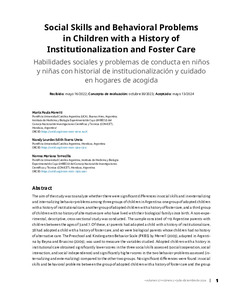Por favor, use este identificador para citar o enlazar este ítem:
https://repositorio.uca.edu.ar/handle/123456789/19082| Título: | Social skills and behavioral problems in children with a history of institutionalization and foster care Habilidades sociales y problemas de conducta en niños y niñas con historial de institucionalización y cuidado en hogares de acogida |
Autor: | Moretti, María Paula Ibarra Ureta, Nandy Lourdes Edith Torrecilla, Norma Mariana |
Palabras clave: | HABILIDADES SOCIALES; PROBLEMAS DE CONDUCTA; ATENCION INSTITUCIONAL; ACOGIDA TEMPORAL; VULNERABILIDAD; NIÑOS; INFANCIA | Fecha de publicación: | 2024 | Editorial: | Universidad Católica de Colombia | Resumen: | The aim of the study was to analyze whether there were significant differences in social skills and in externalizing and internalizing behavior problems among three groups of children in Argentina: one group of adopted children with a history of institutional care, another group of adopted children with a history of foster care, and a third group of children with no history of alternative care who have lived with their biological family since birth. A non-experimental, descriptive, cross-sectional study was conducted. The sample consisted of 119 Argentine parents with children between the ages of 3 and 7. Of these, 41 parents had adopted a child with a history of institutional care, 38 had adopted a child with a history of foster care, and 40 were biological parents whose children had no history of alternative care. The Preschool and Kindergarten Behavior Scale (PKBS) by Merrell (2003), adapted in Argentina by Reyna and Brussino (2009), was used to measure the variables studied. Adopted children with a history in institutional care obtained significantly lower scores in the three social skills assessed (social cooperation, social interaction, and social independence) and significantly higher scores in the two behavior problems assessed (internalizing and externalizing) compared to the other two groups. No significant differences were found in social skills and behavioral problems between the group of adopted children with a history of foster care and the group of children without a history of alternative care who have lived with their biological family since birth. Foster care could be considered a protective factor for children at risk. | Cobertura Espacial: | Argentina | URI: | https://repositorio.uca.edu.ar/handle/123456789/19082 | ISSN: | 1909-9711 (online) | Disciplina: | PSICOLOGIA | DOI: | 10.14718/ACP.2024.27.2.1 | Derechos: | Atribución-NoComercial-CompartirIgual 4.0 Internacional | Fuente: | Acta Colombiana de Psicología. 2024, 27 (2). |
| Aparece en las colecciones: | Artículos |
Ficheros en este ítem:
| Fichero | Descripción | Tamaño | Formato | |
|---|---|---|---|---|
| social-skills-behavioral.pdf | 525,67 kB | Adobe PDF |  Visualizar/Abrir |
Este ítem está sujeto a una Licencia Creative Commons

